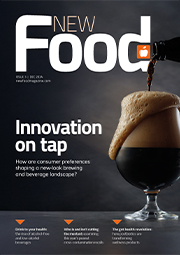Is the UK operating a dual food system?
Posted: 29 October 2018 | Chris Elliott | No comments yet
Chris Elliott voices his concerns regarding the UK’s food supply system and its increasing polarisation in terms of safety for members of society.


When the Food Standards Agency was pressed on how it was tackling these points of concern, it simply kicked it back to Local Authorities (LAs), declaring it was their responsibility to take the necessary action. This is not the leadership we expect from the national guardian of our food supply system.
From my perspective, the survey results throw up a number of important questions and crucial facts about the UK’s food supply and represent a stark warning (as voiced by me). The questions are thus: Is the fact that over 50 per cent of samples had issues with labelling, or the fact that less than 50 per cent of LAs did any testing at all, of greater concern? To me, the former fact is bad but the latter is far more serious. The cause of this alarming statistic is, according to my discussions with many people who work for LAs, the extreme cutbacks in LA funding over the past decade. The front-line troops who protect us – the Environmental Health Officers – are an increasingly endangered species. Those that remain face the near-impossible task of checking and advising the many thousands of food businesses within their jurisdiction with, in many cases, next to no budget to carry out sampling.
The next question; is this pattern the same across the entire UK food industry? In some respects, I’m pleased to say, my knowledge of this is reasonably good and I’m aware of the immense work and resources that the large food processors and retailers put into ensuring the integrity of what we purchase. The Food Industry Intelligence Network, formed in response to the recommendations I made to the UK government in 2014, is a shining example of how an industry can police itself. However, this network represents only the big players in the UK food industry, while the myriad of small processors, retailers and food catering outlets have no such systems in place. Meanwhile, we, the UK public, are entirely dependent on governmental monitoring to ensure the safety and integrity of all the products they sell to us. It is hard to argue that we don’t now have a parallel set of standards for food business operators across the UK. Those individuals that rely heavily on the small stores and purchase larger amounts of fast food than the norm are clearly at a much higher risk of being cheated. It is also clear that this category of UK citizen tends to be those worst off in our society. From my perspective, it appears that this crucial fact was simply not picked up by the media or – more importantly –by our government.
I can envisage the LAs’ ability to police multiple food producers and outlets further reducing to the point at which a major tilting point in food safety will occur, and possibly with devastating effects. Must we really wait for the equivalent of a Grenfell Tower disaster in our national food system before our government takes responsibility to safeguard our national food supply system; and particularly the less well off in our society
The rest of this content is restricted - login or subscribe free to access


Why subscribe? Join our growing community of thousands of industry professionals and gain access to:
- bi-monthly issues in print and/or digital format
- case studies, whitepapers, webinars and industry-leading content
- breaking news and features
- our extensive online archive of thousands of articles and years of past issues
- ...And it's all free!
Click here to Subscribe today Login here




